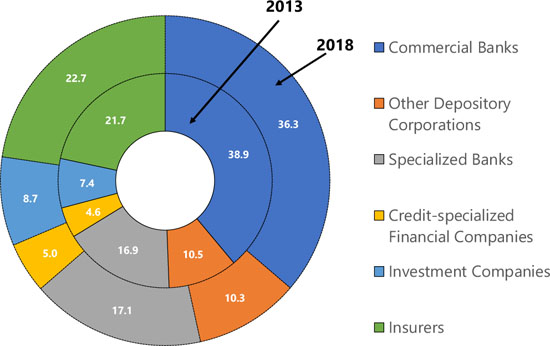In a rapidly evolving financial landscape, where the lines between traditional assets and their digital counterparts blur, the role of regulatory bodies becomes pivotal. The Financial Supervisory Service of South Korea is poised to lead the way in establishing standards for listing procedures, internal controls, and the issuance and distribution of virtual assets. Additionally, it is charting the course for a “virtual asset market audit and oversight system” that will shape the future of this burgeoning industry. Let’s delve into the intricate details of these groundbreaking developments.
Setting the Stage: Understanding Virtual Assets
Before we explore the visionary steps taken by The Financial Supervisory Service of South Korea, it’s essential to grasp the concept of virtual assets. Virtual assets are digital representations of value that can be transferred, stored, or traded electronically. This category encompasses cryptocurrencies like Bitcoin, Ethereum, and a multitude of other tokens and coins that have become increasingly popular over the past decade.
The Financial Supervisory Service’s Bold Initiative
The Financial Supervisory Service of South Korea, often abbreviated as the FSS, is the country’s primary regulatory authority responsible for overseeing and supervising financial institutions. In recent years, the explosive growth of virtual assets has prompted the FSS to address the need for a comprehensive regulatory framework. As a forward-thinking regulatory body, the FSS has embarked on a mission to establish robust standards for various aspects of virtual asset management.
Listing Procedures: Bringing Order to the Virtual Asset Market
One of the critical aspects of the FSS’s initiative is to standardize listing procedures for virtual assets. This involves defining clear guidelines and requirements for projects seeking to list their digital tokens on cryptocurrency exchanges operating in South Korea. By doing so, the FSS aims to ensure transparency, fairness, and investor protection within the virtual asset market.
Enhancing Internal Controls
Maintaining the integrity and security of virtual assets is a top priority for the FSS. To achieve this, the regulatory body is working on setting stringent standards for internal controls within virtual asset-related businesses. This includes requirements for secure storage of digital assets, risk management, and the prevention of fraudulent activities.
Issuance and Distribution of Virtual Assets
As virtual assets are increasingly being used as a means of raising capital through Initial Coin Offerings (ICOs) and other methods, the FSS is determined to establish clear rules and guidelines for the issuance and distribution of virtual assets. This includes the disclosure of relevant information to potential investors and ensuring that the process adheres to regulatory standards.
The Virtual Asset Market Audit and Oversight System
Perhaps one of the most groundbreaking aspects of the FSS’s initiative is the creation of a “virtual asset market audit and oversight system.” This system will be designed to monitor and regulate virtual asset exchanges and businesses continually. It will ensure that all entities operating within the virtual asset space comply with the established standards and regulations.
The Impact on South Korea’s Virtual Asset Ecosystem
The measures taken by The Financial Supervisory Service of South Korea will undoubtedly have a profound impact on the country’s virtual asset ecosystem. By creating a robust regulatory framework, the FSS is likely to enhance investor confidence, leading to more significant participation in the virtual asset market. This, in turn, can contribute to the growth and development of the digital asset industry in South Korea.
Furthermore, the establishment of clear listing procedures and internal controls will not only safeguard investors but also provide a level playing field for virtual asset businesses. Start-ups and established players alike will benefit from a standardized approach to listing and control mechanisms, fostering innovation and competition.
A Global Perspective
The FSS’s initiatives in the virtual asset space are not just limited to South Korea. The ripple effect of these regulations is likely to be felt globally. As South Korea is a significant player in the virtual asset market, its regulatory actions can influence the international landscape. Other countries may look to the FSS’s standards as a benchmark for their regulatory frameworks, further harmonizing the virtual asset market on a global scale.
Challenges and Collaborations
While these initiatives by The Financial Supervisory Service of South Korea are undoubtedly progressive, they are not without challenges. Balancing the need for regulation with fostering innovation and growth in the virtual asset sector is a delicate task. To address these challenges effectively, the FSS is collaborating with industry stakeholders, including virtual asset exchanges, businesses, and technology experts. This collaborative approach aims to create a balanced regulatory framework that ensures compliance without stifling innovation.
Conclusion
The Financial Supervisory Service of South Korea’s commitment to establishing standards for listing procedures, internal controls, and the issuance and distribution of virtual assets is a commendable step in the ever-evolving world of digital finance. The creation of a “virtual asset market audit and oversight system” further solidifies South Korea’s position as a pioneer in this field. As these initiatives take shape, they hold the potential to redefine how virtual assets are perceived and utilized, not only in South Korea but on a global scale. The world will be watching as the FSS continues to shape the future of virtual asset management.
